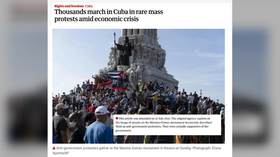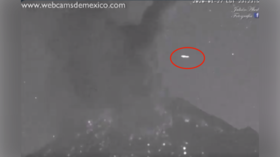Western media use images of PRO-government rally, protest in Miami to illustrate Cuban unrest as Havana warns of ‘soft coup’

Several Western news outlets have used an erroneously captioned photo showing a pro-government rally in Cuba, deeming it an opposition protest, while CNN opted for an image of a Miami demonstration instead, raising eyebrows.
Captured by Associated Press photographer Eliana Aponte during a demonstration in support of the government in the Cuban capital on Sunday, the photo has made the rounds in the Western corporate press as unrest grips the Caribbean nation. However, multiple outlets have incorrectly described the image as an “anti-government protest,” including the Guardian, Fox News, the Financial Times, the New York Times, the Washington Times and Voice of America. The latter outlet, the US-government funded VOA, committed the error on two separate occasions.
GrayZone journalist Ben Norton and Alan MacLeod of MintPress News were among the first to note the error, sharing screenshots of several examples. MacLeod suggested the outlets may have simply “copied and pasted” the AP’s original photo caption, replicating the error across multiple agencies.
The disinformation on Cuba is so blatant: Pro-war, neoliberal British newspaper The Guardian used a photo of Cubans rallying with the July 26 flag (the name of the revolutionary movement founded by Fidel Castro) and falsely claimed they're "anti-government protesters"Fake news! pic.twitter.com/3FCXcUPOxK
— Ben Norton (@BenjaminNorton) July 12, 2021
A ton of corporate media, including the Financial Times, Fox News, The New York Times and The Guardian have used a pic of a PRO-govt rally in Cuba 🇨🇺 to illustrate their articles on anti-government protests, falsely claiming the huge crowds to be on the side of the US. pic.twitter.com/eKo9QJzzeP
— Alan MacLeod (@AlanRMacLeod) July 13, 2021
Both journalists pointed out the red-and-black flags hoisted by demonstrators in the photo, which read “26 Julio,” a reference to Fidel Castro’s 26th of July movement. The organization played a major role in the Cuban Revolution and later formed into a political party, with the two-colored flag becoming a common symbol of support for Cuba’s communist government.
Of the six news outlets cited above, only the Guardian had issued a correction at the time of writing, stating that it amended its story because the “original agency caption on the image... incorrectly described them as anti-government protesters. They were actually supporters of the government.”
The @Guardian (of Blairism) has quietly corrected its fake news, admitting that the photo it published of people rallying in Cuba were actually PRO-government, not anti-government as it had falsely claimed before.https://t.co/1sWyHSmmJcpic.twitter.com/16KLhoehCc
— Ben Norton (@BenjaminNorton) July 13, 2021
The AP image is not the only photo to be misrepresented in Western media coverage. On its Instagram page, CNN also strongly implied that another photo showed Cuban protesters, with its caption reading, in part, “Thousands of Cubans protested a lack of food and medicine.” The image in question was taken by an AFP photographer, and a search through the agency’s photo gallery shows the rally was actually held in Miami, Florida. CNN appears to have omitted the first portion of the AFP caption, which made clear the protest was based in the US.
So @CNN is using a photo of a protest in Miami and pretending it's Cuba. Very normal. #ManufacturedConsent#SOSCubapic.twitter.com/y9Sge9pwAX
— Chad Loder (@chadloder) July 13, 2021
The photo mix-ups in corporate media have been compounded by a wave of false and misleading posts by observers online, with many users sharing photos of gatherings in Egypt, Spain and Argentina while claiming they depict unrest in Cuba – some racking up thousands of shares.
The anti-state protests kicked off in earnest on Sunday, seeing large crowds of demonstrators take to the streets in Havana and elsewhere to demand urgent action on food, medicine and power shortages. The government, however, claims the rallies are fueled by hostile foreign powers, namely Washington, and involve only a small number of ‘counter-revolutionaries’. President Miguel Diaz-Canal said US sanctions were to blame, arguing that Washington’s “policy of economic suffocation” aimed to “provoke social unrest” in Cuba.
Diaz-Canal also alleged that a “campaign against the Cuban revolution” had kicked off on social media platforms, saying they are “drawing on the problems and shortages we are living.” According to internet monitoring firm NetBlocks, Cuba’s state-run web provider ETECSA has moved to restrict access to certain sites and apps since the bout of unrest erupted on Sunday.
The head of the Cuban Communist Party's ideological department, Rogelio Polanco Fuentes, also claimed that the country is experiencing an attempt at a “color revolution” or a “soft coup,” drawing a comparison to a failed US-backed uprising in Venezuela back in 2019.
Washington, for its part, has offered rhetorical backing to the protesters, with State Department spokesman Ned Price telling reporters on Tuesday that the government is looking at ways to “support the Cuban people,” though he did not elaborate.
Havana has so far offered few details on the number of arrests made or injuries sustained during the protests, though the Cuban Interior Ministry confirmed that the first death occurred during an anti-government action on Monday. Opposition groups, meanwhile, have alleged that a spate of arrests has targeted protesters, journalists and other activists.
Also on rt.com Cuba reports 1st death amid anti-govt protests as US says Cubans coming by sea NOT welcomeThink your friends would be interested? Share this story!














